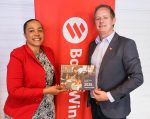Capricorn Group Limited has increased its stakeholder value created by 15.9% to N$5.1 billion compared to the previous financial year, annual financial results for the year ended 30 June 2024 reveal.
Of the total value of N$5.1 billion created, N$1.3 billion is represented by staff remuneration and benefits, N$924 million was paid to suppliers, and N$1.2 billion was contributed to the government in the form of direct and indirect taxes.
The Group delivered a strong financial performance with year-on-year growth of 9.9% in profit after tax to N$1.74 billion (2023 restated: N$1.58 billion). Return on equity (“ROE”) increased to 17.9% from the 17.6% reported in the previous financial year.
David Nuyoma, Group CEO, emphasised in the release of the results that the Group remains focused on working towards a sustainable future for the Group and its stakeholders. He stated, “As responsible corporate leaders, we must challenge our relevance to stakeholders and continuously re-evaluate how we make an impact. I am pleased that our commitment to improving lives through leadership in financial services by being Connectors of Positive Change has positively impacted many lives this past financial year, resulting in noteworthy value creation.”
The positive financial performance of the Group for the period ending 30 June 2024 enabled the Group to create value for all our stakeholders, contributing to the socio-economic development of Namibia and Botswana.
Capricorn Group Chief Financial Officer Johan Maass said, “The results are attributed to excellent results and solid all-round performances across the Group’s portfolio of businesses, which includes the banking subsidiaries, Bank Windhoek and Bank Gaborone, as well as Capricorn Asset Management (“CAM”), Entrepo Group, Peo Finance and our associates.”
The Group’s performance is presented below in terms of earnings quality, credit quality, liquidity, and capital depth, the four main pillars of the Group’s business.
The Group’s net interest income before impairment charges increased by 13.6% to N$3.1 billion (2023: N$2.7 billion). Interest income growth was driven by higher interest rates and a 7.5% year-on-year growth in the loan book. Bank Windhoek’s net interest income grew by 9.9% in 2024 on the back of 4.6% loan book growth and the endowment effect of the higher interest rate cycle. Bank Gaborone’s net interest income increased by 40.8% due to continued loan book growth and an improved net interest margin.
Non-interest income increased by 14.2%, largely attributable to a 12.6% increase in transaction-based fees on the back of increased transaction volumes, especially on digital channels. Asset management fees from Capricorn Asset Management increased by 12.9% due to strong growth in assets under management.
Operating expenses increased by 12.2%, which is higher than inflation. This rise can be attributed to a 22.9% increase in variable operational banking expenses, directly linked to increased transaction and trading volumes. Excluding these variable operational banking expenses, the growth in overall expenses was contained at 11.2%. Much of this growth is associated with increased employee costs, driven by annual increases and the recruitment of talent to fill key positions, especially in the information technology space. Information technology expenditure increased by 22.0% compared to the previous financial year on the back of significant investment in digital and data-related projects and as a consequence of a weakening currency. The Group, nevertheless, improved its cost to income ratio to 50.0% (2023 restated: 51.0%).
The Group has well-developed capabilities to protect the quality of its lending assets. The Group’s non-performing loans (NPLs) decreased on the back of some large recoveries during the financial year. The Group’s NPL ratio, excluding interest in suspense, improved from 4.5% in 2023 to 4.0%. Despite these large recoveries, the difficult macroeconomic environment and a prolonged period of higher interest rates negatively impacted credit risk indicators, leading to an increase in impairment charges to N$328.5 million (2023: N$235.6 million). The Group’s loan loss rate increased from 0.51% to 0.67%, still in line with industry norms.
Gross loans and advances increased by 7.4% to N$50.7 billion this year, mainly attributable to growth in term loans and article finance.
The Group will always prioritise ensuring adequate liquidity over profit maximisation. Overall, the Group maintained a strong liquidity position, with liquid assets increasing by 19.1% to N$18.5 billion (2023: N$15.5 billion). Liquid assets exceeded the minimum regulatory requirements in Namibia and Botswana by 127% and 143%, respectively, at the financial year end, while the Group’s loan to funding ratio of 86.3% remains below its internal threshold of 90.0%. Notwithstanding these surpluses, the Group maintains an N$1.0 billion contingency funding reserve for its two banking subsidiaries.
The Group improved on its strong capital position, with a total risk-based capital adequacy ratio of 17.9% (2023: 16.9%), well above the minimum regulatory requirement of 12.5%.
The Group declared a final dividend of 64 cents per ordinary share, which will be paid to shareholders on 18 October 2024. Including the interim dividend of 48 cents per ordinary share, this represents a total dividend of 112 cents per ordinary share (2023: 100 cents). This is a 12.0% increase on the total dividend per share for 2023. The Group continues to balance offering attractive returns for shareholders with retaining capital to drive growth and diversification.










